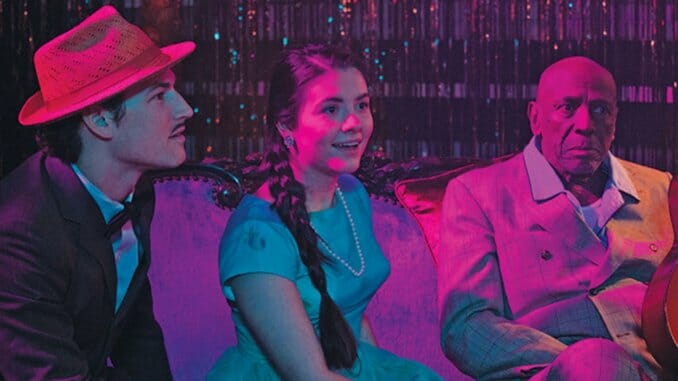The Cuban Undermines Its Heart with Wikipedia-Level Research
Image via Brainstorm Media Movies Reviews Sergio Navarretta
Human beings live in multiple timelines simultaneously: That’s the superpower we call “memory.” Everyone makes use of that power every day, whether for reasons mundane or extraordinary. Usually it’s the former: We remember where we left our car keys so we can make the morning commute, or we remember we have to pick up groceries on the way home. Sometimes, though, it’s the latter when we’re able to dig deep into the past to recall defining moments of our lives, from painful reminiscences of last words spoken to grandparents or first loves.
Sergio Navarretta’s new movie, The Cuban, is partly about the way our minds let us time travel on a limited scale, but the first thing most viewers will notice about is that it looks like dishwater: flat and grey-beige, totally drained of vitality as Navarretta’s lens (guided by cinematographer Celiana Cárdenas) tours along the first floor of a long-term care home, where the brightest spot is a resident’s landscape painting. All else is dismal, bereft of color or spirit or a pulse, which is Navarretta’s probable intent. People don’t go to facilities like this to die, per se, and they don’t “go” as much as they’re “taken,” but all the same they end up suffering a low, slow, simmering death where they’re stripped of what dignity they have by nurses and doctors and orderlies with treatment plans that feel tailored toward dehumanization instead of actual care.
The Cuban clearly has strong feelings about that dynamic, carried through both Navarretta’s direction and Alessandra Piccione’s screenplay. They make the point in the movie’s first few minutes and then keep on making it like a carpenter pounding nails entirely through floorboards. Fortunately, they have Ana Golja and Louis Gossett Jr. to give The Cuban some structural integrity. She plays Mina, an Afghani immigrant who works at the nursing home and lives with her aunt, Bano (Shohreh Aghdashloo), in Canada, while he plays Luis Garcia, one of the addled octogenarians living at said home. Mina wants to do right by her patients. Luis is a handful, a shell of a man who doesn’t eat and gets agitated over too much exposure to other people. He’s also an accomplished musician with an abiding love of jazz, shared in common by Mina.
Because Mina’s mind isn’t entirely on her work, and because she has greater aspirations beyond pre-med study, she sets about pulling Luis out of himself and into the land of the cognizant. She plays music for him, noting his fondness for Benny Moré. She learns how to prepare Cuban cuisine and sneaks plates of steaming deliciousness into the home and under the nose of the cook. She pulls her cousin Zahra (Shiva Negar) and her boyfriend Kris (Giacomo Gianniotti) into her schemes, too, bringing Luis to the present by helping him reconnect with his past.
It’s a sweet hook, and the very best of The Cuban’s material rests on interactions between Golja and Gossett, she the eager, genuine do-gooder, he the elderly lovelorn El Guitarrista trapped in his own head via the combination of vascular dementia and Alzheimer’s. But Piccione overextends her writing. Mina’s determined involvement in Luis’ wellbeing opens up to include commentary on her background, and Bano’s, and Afghani cultural mores, details expanded on so much that they feel like they belong in another movie entirely. Occasionally these precepts build off of what The Cuban tries to accomplish by pairing Mina with Luis, but mostly they overwhelm that purpose. Piccione and Navarretta could have welded Mina’s immigrant story with Luis’ and found harmony in their disparate experiences.
That never quite happens, which is fine. The Cuban works when sticking to the warm hangout vibe cultivated by Golja and Gossett’s performances. The less obvious sobriety the film indulges, the better. “Music stimulates the dorsolateral frontal cortex, right?” Kris says to Mina about a half hour into the movie in an exchange that feels like it exists to justify use of mental decay as a plot point: It’s a knowledge statement, proof that the authors did their homework, but The Cuban isn’t the kind of movie that needs academic approval. Weirdly, the script’s attempts at feigning authenticity read as disingenuous, because all the authenticity the film needs is baked into its leads.
Navarretta’s better off leaning into their dynamic instead of reaching for accuracy. Golja and Gossett’s joint appeal—his rascally charm, her coltish earnestness—gives The Cuban soul, shining light through the gloom of brain decline and the horrors of an ambivalent healthcare system. Who needs validation when you have heart?
Director: Sergio Navarretta
Writer: Alessandra Piccione
Starring: Ana Golja, Louis Gossett Jr., Giacomo Gianniotti, Shoreh Aghdashloo, Shiva Negar, Lauren Holly
Release Date: July 31, 2020
Bostonian culture journalist Andy Crump covers the movies, beer, music and being a dad for way too many outlets, perhaps even yours. He has contributed to Paste since 2013. You can follow him on Twitter and find his collected work at his personal blog. He’s composed of roughly 65% craft beer.